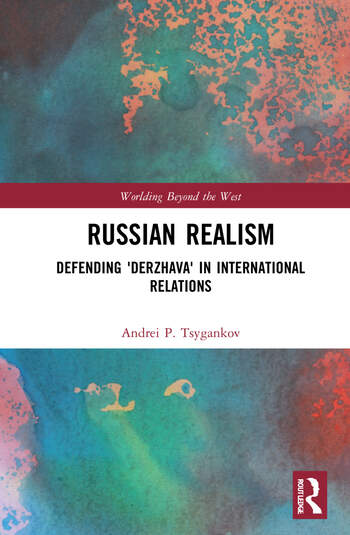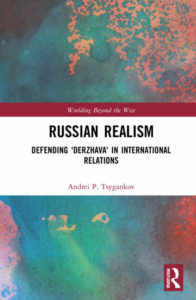
Russian Realism: Defending “Derzhava” in International Relations by Andrei P. Tsygankov
 The East is a delicate matter
The East is a delicate matter
According to the leading US-based Russian scholar Andrei Tsygankov, realism—an international relations (IR) school that prioritizes sovereignty, security, and national interests—has dominated the Russian theory of IR, representing a nuanced spectrum of approaches to Russia’s development and place in global affairs. A complex historical and conceptual account of Russian foreign policy, Russian Realism: Defending “Derzhava” in International Relations was published in spring 2022 as Russia had already invaded Ukraine. Hence, the book appeared immediately as highly relevant to explain the defensive nature of the Russian Derzhava and even comfort readers about the roots of the current war in Ukraine. In nine chapters, Andrei Tsygankov explains why the realist school has dominated Russian IR geopolitical thinking by exploring the concept of Derzhava as its foundation. Derzhava describes “a strong state with the idea of a great power and protection from foreign threats” (6). By projecting Russia as Derzhava, i.e., a powerful state able to defend its distinct interests and norms, Russian realism has aimed to compensate for Russia’s semi-peripheral position in the global arena and for its historical socioeconomic backwardness.
Thus, Derzhava, according to Tsygankov, ultimately has served defensive and non-imperial goals. Observed from the European Union (EU) during the spring and summer of 2022, as Europe had been overwhelmed with the COVID-19 pandemic and had attempted to secure minimal living conditions for the growing number of Ukrainian refugees, this argument seemed completely misleading. However, for Tsygankov, the concept is highly relevant for the analysis of the development of the Russian realist IR school. He demonstrates this relevance within the historical, cultural, and regional contexts of Russia’s self-positioning in the global arena, which can be summarized by an old Russian proverb, Vostok—delo tonkoe, which means “the East is a delicate matter.” This context-based approach, as Tsygankov points out, is in sharp contrast with Western schools of IR, which prioritize the rule of law and human rights as universal values. Moreover, Tsygankov draws readers’ attention to and explains the significance of what he calls “communalist and contextual standards of knowledge” that are based on religion, civilization, and civilizational identity. Indeed, Tsygankov actively and elegantly applies individualist and objective (Western) knowledge standards, which are based on analysis, verification, and falsifiability.
The meaning(s) and role(s) of “Derzhava”
Tsygankov masterly explains that Russian realists have traditionally held a middle position in the debates opposing the Westernizers to the Slavophiles. Westernizers put individual rights at the center of domestic and global politics, prioritize international institutions and norms for the protection of human rights, and favor a European path for Russia’s development. In contrast, Slavophiles prioritize collective values, separating themselves from other cultural communities, and support the primacy of cultural or civilizational sovereignty over state-based sovereignty. This focus on collective values results in cultural exceptionalism and anti-Western perspectives in domestic and foreign affairs.
In synthesizing Western and Russian IR theories and narratives, Tsygankov offers four types of power emerging out of IR: strong, rising, declining, and weak power. Each type gets momentum depending on the particular historical context. Tsygankov unpacks “Derzhava,” reminding the reader of samoderzhaviye, which means “the ability to unite the rulers and the ruled by consent” (45). Overtime, this concept has come to mean autarky rather than democratic governance. Furthermore, in analyzing the most influential approach within the Russian Realist school, Tsygankov introduces the “global balancers” as proponents of a vision of Russia as standing on equal footing with other centers of global power. The global balancers are among the most conservative thinkers in the Russian realist IR tradition.
Realist Westernizers, as embodied by the thinker Aleksei Bogaturov, have considered Russia as an integral part of Europe, while Eurasian regionalists, represented by Vadim Tsymbursky, have defined Russia as a regional power. However, “Derzhava” ultimately has served the policy goals of a defensive and non-imperial Russia, aiming to compensate the disadvantaged position of Russia in the global order. Moreover, within the Russian realist school of IR, different views have emerged on contemporary global change and on challenges and the most suitable responses to those challenges. Global balancers have perceived the decline of the West (and the rise of non-West) as a major contemporary change and have seen Russia as the main solution to counterbalance this decline. In contrast, realist Westernizers have perceived the decline of the West as temporary and seen Russia as allying with the West. In contrast, Eurasian regionalists have recognized the rise of regionalism and focused on Eurasia as the only significant region for Russia’s security and development.
Tsygankov surveys some of the most prominent Russian realist thinkers who represent the three schools of thought and offers a warning. He observes that international actors have neglected or undermined Russia’s great power, resulting in military (re)actions, including Russia’s invasion of Georgia in 2008 and the annexation of Crimea in 2014. This list of invasions may lengthen if Russia’s interests are further undermined. Simultaneously, Russian realists’ overestimation of external threats may turn counterproductive for Russia. Thus, short of justifying Russia’s invasions of neighboring countries, Tsygankov’s analysis and arguments resonate with Russian leadership’s seemingly schizophrenic explanations for the current invasion of Ukraine. On the one hand, the Russian Ministry of Foreign Affairs and global balancers have perceived NATO as aggressively expanding. On the other hand, Eurasian regionalists have highlighted the need to defend Russian or Russian-speaking populations in Ukraine. However, Russian Realism differs from Yuval Noah Harari’s “21 Lessons for the 21st Century,” which have revealed the enduring significance of culturally embedded ideologies and regional contexts in contemporary international affairs.
Learning about Russia’s foreign policy without focusing on Russia’s global role as gas and oil exporter
Tsygankov’s book focuses on Russian geopolitical thinking and its peripheral attention to the wider context of Russian domestic and foreign policy, making this book required reading for anyone studying Russian foreign policy. The volume also makes an important contribution to European studies and broader IR scholarship. It will be of interest to European and Northern American scholars, diplomats, and foreign policy decision-makers who seek to explain the relationships of different countries with Russia to build a sounder and more constructive dialogue not only with it, but also with other post-socialist states, including China, which is as rising global hegemon. At the same time, Tsygankov’s inquiry to a large extent overlooks the Russian realists’ approach to Russia as a great power that is also a major global exporter of gas and oil, which Russian foreign policy officers have always exploited, as indicated by Dmitry Trenin, who Tsygankov quotes as a realist Westernizer. Similarly, Russia’s energy exports to Europe constitute a central contemporary factor in the global balancers’ approach to Russia’s economic and political power in its relations with the EU. In his discussion on the global balancers, Tsygankov surprisingly omits that for them the Ukrainian Orange Revolution in 2004 represented the turning point in Russia’s relations with Ukraine. However, Tsygankov compensates this omission by focusing on the equally important and even more pro-democratic Euromaidan revolution that took place in 2014. Clearly, this revolution had grave consequences for Ukraine, such as the annexation of Crimea by Russia in 2014 and the war in the Eastern Ukrainian regions of the Donbass.
For non-expert readers unfamiliar with Russian geopolitical thought, the different strands of Russian realism may appear overwhelming. However, Tsygankov’s book may help postgraduate students in IR and political science courses familiarize themselves with the broader context of other geopolitical schools of thought, for example with the liberals and socialists who emerged as political groups in Russia in the nineteenth century, and with Slavophiles or civilizationalists, whose political thinking dates back to the late Middle Ages. Overall, the volume Russian Realism Defending “Derzhava” in International Relations represents a rich constructivist account of the reasoning behind contemporary Russian foreign policy. The volume is a highly recommended reading for politicians and business professionals in Europe and Northern America and for a broader academic audience in Russia.
Sanja Tepavcevic, PhD, is a Research Fellow at the Institute of Advanced Studies Koszeg and Lecturer of MA International Studies Program at the University of Pannonia, Koszeg Campus, Hungary. Her research expertise includes Russian foreign policy and the foreign direct investments of Russian companies, post-Soviet migrations and immigrant entrepreneurship, and migration and foreign economic policies in former Yugoslav states and the countries of the Visegrad 4 Group.
Russian Realism. Defending “Derzhava” in International Relations
By Andrei P. Tsygankov
Publisher: Routledge
E-Book / 184 Pages / 2022
References
Harari, Yuval. 2019. 21 Lessons for the 21st Century. Vintage: London, England
Published on January 24, 2023




